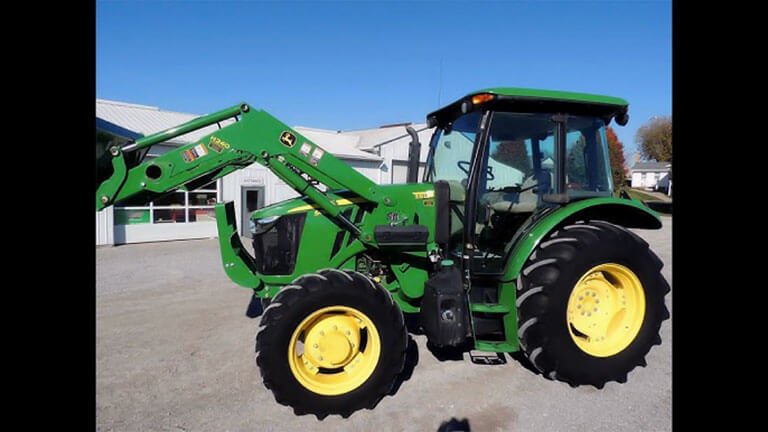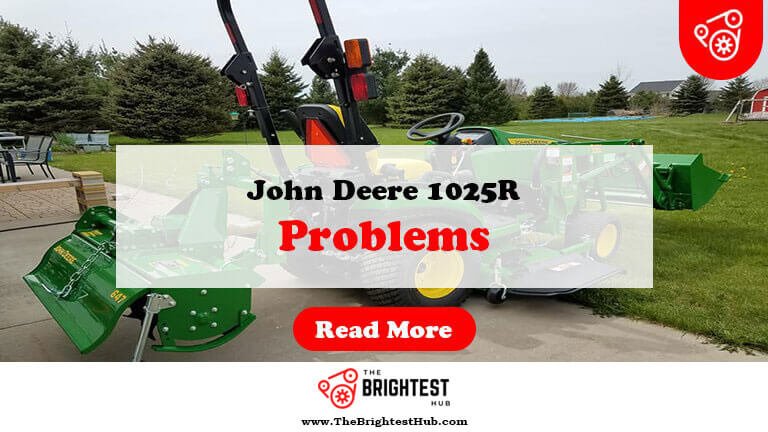John Deere 5085E Problems: Troubleshoot & Resolve
The John Deere 5085E can experience issues with the transmission, electrical system, and hydraulic components. Regular maintenance is crucial to prevent these problems.
The John Deere 5085E is a popular choice among farmers and agricultural professionals. Known for its durability and efficiency, this tractor can still face various challenges. Common problems include transmission failures, electrical malfunctions, and hydraulic issues. These complications can significantly impact productivity and lead to costly repairs.
Understanding the potential issues with the 5085E is essential for effective management and maintenance. Farmers can avoid downtime by identifying early warning signs and addressing them promptly. This blog will delve into the common problems, their causes, and preventive measures to keep your tractor running smoothly and efficiently.
Introduction To The John Deere 5085e

The John Deere 5085E is a popular utility tractor. It is known for its reliability and performance. Farmers and contractors often choose this model for various tasks. Understanding its key features helps in making informed decisions.
Why Choose The 5085e?
The 5085E stands out among other tractors for several reasons:
- Powerful Engine: The 5085E has an efficient engine.
- User-Friendly: Easy controls make operation simple.
- Versatile: Ideal for farming, landscaping, and construction.
- Durability: Built to withstand tough conditions.
Key Features
Here are some key features of the John Deere 5085E:
| Feature | Description |
|---|---|
| Engine | 85 HP, 3-cylinder diesel engine |
| Transmission | SyncShuttle transmission with 12 forward and 12 reverse gears |
| Hydraulics | Open-center hydraulic system with 3-point hitch |
| Cab | Spacious and comfortable cab with excellent visibility |
The John Deere 5085E combines power and efficiency. Its features meet various agricultural needs. Many users appreciate its reliability and ease of use.
Common Issues With The 5085e
The John Deere 5085E is a reliable tractor. Yet, users face some common problems. Understanding these issues helps prevent bigger repairs. Here are two major areas of concern.
Electrical Challenges
Electrical problems can hinder tractor performance. Many users report issues with:
- Battery Drain
- Faulty Wiring
- Blown Fuses
- Starter Motor Failures
Battery drain often occurs during prolonged use. The wiring can wear down, causing shorts. Blown fuses can stop equipment from working. Starter motor failures may prevent the tractor from starting.
Hydraulic System Faults
The hydraulic system is crucial for operation. Common faults include:
- Fluid Leaks
- Poor Performance
- Inconsistent Power
Fluid leaks can lead to low pressure. This causes poor performance and inconsistent power. Regular checks help maintain the hydraulic system.
| Issue | Description | Solution |
|---|---|---|
| Battery Drain | Excessive energy usage or faulty battery. | Check battery condition and connections. |
| Fluid Leaks | Loss of hydraulic fluid affects performance. | Inspect hoses and connections regularly. |
| Faulty Wiring | Damaged wires can cause shorts. | Replace damaged wires promptly. |
| Starter Motor Failures | Engine won’t start due to motor issues. | Test and replace starter motor if needed. |
Engine Performance Troubles
The John Deere 5085E is a reliable tractor. Yet, some users face engine performance troubles. These issues can affect productivity and efficiency. Let’s explore two common problems: overheating and power loss.
Overheating
Overheating can cause serious damage. Here are some common causes:
- Low coolant levels
- Clogged radiator
- Faulty thermostat
- Poor airflow
Check your tractor regularly. Monitor the coolant levels and ensure proper airflow. Consider these overheating symptoms:
| Symptom | Possible Cause |
|---|---|
| Steam from the engine | Low coolant |
| Warning light | Faulty sensor |
| Engine stalling | Overheated components |
Address these issues quickly. Ignoring them can lead to expensive repairs.
Power Loss
Power loss is another common issue. It can slow down your work. Here are some causes of power loss:
- Dirty fuel filters
- Fuel injection problems
- Worn engine components
- Incorrect fuel type
Watch for these signs of power loss:
- Sluggish acceleration
- Unusual engine noises
- Excessive smoke
Regular maintenance helps prevent power loss. Change filters and use the correct fuel. Stay on top of engine health for optimal performance.
Transmission Glitches
The John Deere 5085E is a reliable tractor. Yet, some users report transmission glitches. These problems can affect performance. Understanding these issues helps in troubleshooting. Two common problems are hard shifting and unusual noises.
Hard Shifting
Hard shifting can be frustrating. It happens when gears do not engage smoothly. This can lead to:
- Increased wear on components
- Difficulty in changing speeds
- Potential damage to the transmission
Here are some reasons for hard shifting:
- Low transmission fluid levels
- Dirty or contaminated fluid
- Worn-out clutch plates
Regular maintenance is key to preventing these issues. Check fluid levels frequently. Change the fluid as recommended.
Unusual Noises
Unusual noises from the transmission can signal problems. These noises may include:
- Grinding sounds during shifting
- Clunking noises while in gear
- Whining sounds at high speeds
These noises may indicate:
| Noise Type | Possible Cause |
|---|---|
| Grinding Sounds | Worn gears or low fluid |
| Clunking Noises | Loose components or worn mounts |
| Whining Sounds | Low fluid or bearing issues |
Listening closely helps in early detection. Addressing these sounds quickly prevents costly repairs.
Pto Complications
The John Deere 5085E is a reliable tractor. However, it can face some issues with the Power Take-Off (PTO). These complications can hinder performance and efficiency. Understanding these problems helps in effective troubleshooting.
Engagement Issues
PTO engagement problems are common in the John Deere 5085E. Operators may notice:
- PTO does not engage when switched on.
- PTO engages but loses power quickly.
- Unusual noises during operation.
Common causes include:
- Faulty PTO switch.
- Worn-out engagement mechanism.
- Hydraulic issues.
Regular maintenance can prevent these problems. Check the PTO switch and hydraulic fluid levels frequently.
Output Efficiency
PTO output efficiency is crucial for productivity. Problems can lead to decreased performance. Key signs of inefficiency include:
- Low power output.
- Inconsistent speed.
- Overheating during use.
These issues might arise due to:
| Problem | Possible Causes |
|---|---|
| Low power output | PTO clutch wear, engine issues |
| Inconsistent speed | Hydraulic leaks, faulty sensors |
| Overheating | Blocked cooling system, low fluid levels |
Keep the PTO and surrounding components clean. Regular inspections help maintain optimal output efficiency.
Solving Electrical Problems
Electrical issues can cause serious problems for your John Deere 5085E. Identifying and fixing these problems is essential for smooth operation. Focus on two key areas: battery maintenance and wiring inspections.
Battery Maintenance
Proper battery maintenance keeps your tractor running smoothly. Follow these steps:
- Check connections: Ensure all connections are tight.
- Clean terminals: Remove corrosion with a wire brush.
- Inspect fluid levels: Maintain proper electrolyte levels.
- Test voltage: Use a multimeter to check battery health.
Replace the battery if it shows signs of weakness. A healthy battery ensures reliable starts and prevents electrical failures.
Wiring Inspections
Inspecting the wiring is crucial for preventing electrical faults. Here’s how:
- Visual check: Look for frayed or damaged wires.
- Secure connections: Ensure all plugs and connectors fit snugly.
- Test circuits: Use a multimeter to check circuit integrity.
- Replace worn wires: Swap out any damaged wiring promptly.
Regular inspections can save time and money. Catching problems early helps keep your tractor in top condition.
| Issue | Symptoms | Solution |
|---|---|---|
| Weak Battery | Slow cranking, dim lights | Check connections, clean terminals |
| Frayed Wires | Electrical shorts, blown fuses | Inspect and replace damaged wires |
| Loose Connections | Intermittent electrical issues | Tighten all connections and plugs |
Stay proactive with maintenance. Addressing electrical problems early keeps your John Deere 5085E running smoothly.
Hydraulic System Repairs
The hydraulic system on the John Deere 5085E is vital for smooth operation. Issues can arise, leading to costly downtime. Regular maintenance can prevent major problems. Focus on two key areas: fluid replacement and checks on seals and hoses.
Fluid Replacement
Fluid replacement is crucial for the hydraulic system. Dirty fluid can harm performance. Follow these steps for effective fluid replacement:
- Turn off the tractor and let it cool.
- Locate the hydraulic fluid reservoir.
- Drain the old fluid completely.
- Inspect the fluid for contaminants.
- Fill with fresh hydraulic fluid.
Check the fluid level regularly. This ensures your system works efficiently.
Seal And Hose Checks
Check seals and hoses to avoid leaks. Leaks can lead to low pressure and inefficiency. Here’s how to perform these checks:
- Inspect all hoses for cracks or wear.
- Look for signs of leaks around seals.
- Replace any damaged hoses immediately.
- Ensure all connections are tight.
Regular inspections save money and time. Keep your hydraulic system in top shape.
| Component | Check Frequency | Notes |
|---|---|---|
| Hydraulic Fluid | Every 100 hours | Replace if dirty or low |
| Hoses | Every 50 hours | Look for cracks and leaks |
| Seals | Every 50 hours | Replace if damaged |
Stay proactive. Regular checks can prevent serious issues with your John Deere 5085E.
Preventative Maintenance And Tips
Keeping your John Deere 5085E in top shape is crucial. Regular maintenance helps avoid costly repairs. Here are some practical tips to keep your tractor running smoothly.
Regular Check-ups
Routine inspections are key for your John Deere 5085E. Follow these steps for effective check-ups:
- Oil Changes: Change engine oil every 100 hours.
- Filter Replacements: Replace air, fuel, and oil filters regularly.
- Fluid Levels: Check coolant, hydraulic, and transmission fluids.
- Tire Maintenance: Inspect tire pressure and tread regularly.
Consider keeping a maintenance log. This helps track services and repairs. Here’s a simple table to help you:
| Maintenance Task | Frequency |
|---|---|
| Oil Change | Every 100 hours |
| Filter Replacement | Every 200 hours |
| Tire Inspection | Weekly |
| Fluid Check | Every 50 hours |
Operator Training
Proper training for operators is essential. Knowledgeable operators can prevent many issues. Here are key training areas:
- Understanding Controls: Know all controls and features.
- Safe Operation: Learn safe driving and handling techniques.
- Load Management: Understand load limits to avoid strain.
- Regular Checks: Train operators to perform daily checks.
Invest in training sessions. A well-trained operator can enhance machine lifespan. This leads to fewer problems and lower maintenance costs.
Frequently Asked Questions
What Are Common Issues With John Deere 5085e?
Common issues include electrical failures, hydraulic leaks, and transmission problems that can affect performance.
How To Troubleshoot John Deere 5085e Problems?
Start by checking the battery, fluid levels, and error codes on the display for effective troubleshooting.
What Causes Overheating In John Deere 5085e?
Overheating can result from low coolant levels, a faulty thermostat, or a blocked radiator.
How Reliable Is The John Deere 5085e?
The John Deere 5085E is generally reliable, but maintenance is crucial to prevent potential issues.
What Maintenance Does John Deere 5085e Need?
Regular oil changes, filter replacements, and checking fluid levels are essential for optimal performance.
Conclusion
Understanding the common issues with the John Deere 5085E can help you maintain its performance. Regular maintenance is key to avoiding these problems. If you encounter issues, prompt diagnosis and repair can save you time and money. Stay informed and keep your tractor running smoothly for all your farming needs.






